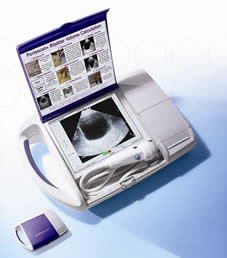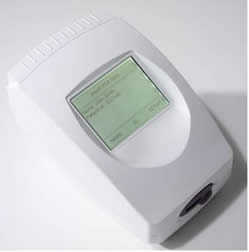

RETURN TO AIMZINE NEWSLETTER HOME | May 2009
| Code: MDW | Sector: Medical Equipment |
| Price: 7.5p | Market Cap £8 million |
| Number of Staff: 61 (inc 18 Sales & Marketing) | Locations: Rugby and Florida |

In our quest for fast growing Aim companies this month we are turning the spotlight on Mediwatch.
The increasing ageing population will mean that world-wide spending on healthcare is likely to increase significantly over the coming years. It would seem that Mediwatch, a urology specialist, is well placed to benefit from this increased spending.
The Group’s flagship product, PSAwatch, certainly seems to have considerable potential. The Group recently reported its first profit and the directors are optimistic about prospects, so now is a good time to take a closer look.
The Shares
Mediwatch was founded by Chief Executive, Philip Stimpson, in 1996 and listed on Aim in June 2000, raising over £6 million at that time to fund product development.
Mediwatch’s first year on Aim was at the height of the tech bubble and their shares enjoyed an exciting climb, almost trebling to 180 pence before crashing to a low of just under 3 pence in 2002. After that the price stabilised and has moved broadly sideways over the last 5 years.

As can be seen from the graph above, the share price had broadly tracked the Aim All Share Index until recent months when Mediwatch shares have strongly outperformed the index.
Mediwatch at a Glance |
|
+ Considerable potential for PSAwatch |
|
+ Move to profitability |
|
+ Increasing product range |
|
+ Recent Inverness deal |
|
- Some disappointments in 2008 |
|
- Debate over value of PSA testing |
|
- Not immune from global slowdown |
|
- Political influence on healthcare budgets |
The Business
Mediwatch produces a range of diagnostic equipment for use by the medical profession. The Group claims that it can act as a ‘one stop shop’ by providing a wide range of products for the urology market. The purchase of the urology diagnostics division of US giant, Medtronic A/S back in December 2006 has enabled the Group to scale quickly to provide this range of products.
The Group subdivides it’s products into three categories: Biochemistry, Urodynamics and Ultrasound. A full description and photographs of all of the Mediwatch products can be found in the products section of their website here.
Recent Developments
The Group continues to both develop new products and make improvements to existing ones. Research and development expenditure in 2008 was £496,000. Additionally, the group has reported three major developments, each of which should have a significant benefit for the Group going forward.
- ‘Zero Flow’: In the results issued in January, Philip Stimpson stated: ‘In March 2007, Mediwatch filed a patent for an innovative, new technology - Lateral flow assay and apparatus. We have called this technology 'Zero Flow'. We believe that Zero Flow (patent pending) has exciting possibilities for diagnostics in the fields of both genomic and proteomic science. Early in January 2009 a senior molecular research scientist, Dr. Marcus Harrison, joined our staff to underpin the development of new tests with molecular markers and to assist in developing the Zero Flow (patent pending) technology platform. We are genuinely excited about the future possibilities this may hold for Mediwatch.’ In August 2008 Mediwatch reported that six directors had subscribed for new shares, to raise a total of £59,750. At that time it was stated that these monies would be used to fund research into a new diagnostic technology – the directors would seem to be genuinely excited enough to risk their own capital.
- Bostwick Pathology services: In June 2008 the Group reached an agreement with Bostwick Laboratories in Richmond, Virginia USA to distribute their molecular marker, PCA3Plus, worldwide outside of the USA and Canada. PCA3Plus is based on the expression of the PCA3DD3 gene which has indicated good performance as a marker for prostate cancer. Mediwatch claim that this test coupled with their PSAwatch test will help clinicians determine which men should undergo a follow-up biopsy.
- Inverness Medical Innovations: In March 2009 Mediwatch announced that it had signed a 5 year agreement with Inverness Medical Innovations Inc for the worldwide distribution of PSAwatch, the Group’s point-of-care PSA tester. The announcement included the following statement: This is a very important and substantial distribution agreement for Mediwatch as Inverness has an extensive global sales-force which will complement Mediwatch's own worldwide distribution network and provide the Company with considerably more market reach. Inverness is recognised as a market leader with significant expertise in marketing point-of-care tests, which they already manufacture for other pathological conditions.
Definitions Urology |
PSAwatch
Under the current procedure, men having a PSA test require two medical appointments. The first is to provide a small blood sample and the second, a few days later, is to review the results of the test. Mediwatch’s PSAwatch is a breakthrough device which can provide PSA test results within one 10 minute appointment. Using PSAwatch has therefore considerable potential to save money for healthcare services as well as saving patients the agonising waiting time for results.
The PSAwatch product (shown on the right) commenced sales into Europe in 2008 following CE approval. In the USA, the FDA approval process is on-going with clinical trials in progress and further news is expected in the first half of 2009. The FDA approval process has taken much longer than originally envisaged, which has undoubtedly had a negative effect on Mediwatch’s share price.
Although it is early days for PSAwatch, Mediwatch have reported that they are generating significant global interest in this product. With approximately 40 million PSA tests conducted globally each year there is certainly a lot of potential here. Furthermore, whilst there is much debate about the value of the PSA test, with the increasing ageing population it would seem likely that the number of tests undertaken will increase in the coming years.
To read more about PSA testing take a look at the Macmillan Cancer Support website. If you are male and over 45, you could also take a look at this US WebMD website to help you decide if you should take a PSA test.

The Numbers
On 26 January 2009 Mediwatch issued their results for the year to 31 October 2008. These showed the Group moving into profit for the first time in its history. Profit before tax increased to £408,000 from a loss of £256,000 in the previous year. Whilst this is obviously excellent progress, the profits reported are somewhat lower than had earlier been forecast. This shortfall is due to a more challenging trading environment than had been anticipated. Furthermore the US regulatory approval of PSAwatch is taking longer than originally expected.
In the 2008 results Mediwatch reported positive cashflow from operations of £802,000 and total net borrowing at 31 October 2008 of £446,000. The Group have recently agreed improved banking facilities with Barclays.
Year Ending |
Revenue |
Pre tax profit (£,000) |
Earnings |
October 2007 |
5,684 |
(265) |
(0.2) |
October 2008 |
9,327 |
408 |
0.3 |
October 2009 (est) |
10,100 |
620 |
0.46 |
October 2010 (est) |
12,000 |
1,200 |
0.89 |
In response to these results, house broker, Fairfax, has trimmed its forecasts for the coming years. Nonetheless, these still show the shares trading on a forward p/e of approximately 11 which seems low considering the growth potential, particularly from PSAwatch.
Results showed the
Group moving into profit
for the first time in its
history
Investment Considerations
Mediwatch is making obvious progress evidenced particularly by the move into profitability. In the most recent results the Group anticipated ‘sustained profitable growth’ with growth in the ‘immediate term’ from:
- Increasing worldwide interest in the PSAwatch system
- New range of Urodynamic equipment which has enhanced our product range
- Entry into pathology services via Bostwick Laboratory agreement
Having missed the original forecasts for 2008, it would seem likely that forecasts for 2009 and 2010 have been set at a conservative level. Forecasting sales for new-to-the-market PSAwatch must be particularly difficult, further exacerbated by the lengthy ongoing FDA approval process. That said, the recent Inverness agreement seems to underline the potential of PSAwatch.
With the obvious potential for growth, we believe the shares are on a low rating. This may be due to concerns of reduced healthcare spending whilst the effects of the ‘credit crunch’ works its way through the economy. However, whilst we have concerns about healthcare spending, Mediwatch is a profitable and growing Group and we believe the shares are worthy of serious consideration by small company investors.
Aimzine will be reporting on developments at Mediwatch over the coming months. We are particularly looking out for an update on the PSAwatch FDA approval process.

Written by Michael Crockett, Aimzine
Copyright © Aimzine Ltd 2009
RETURN TO AIMZINE NEWSLETTER HOME | May 2009
|
||